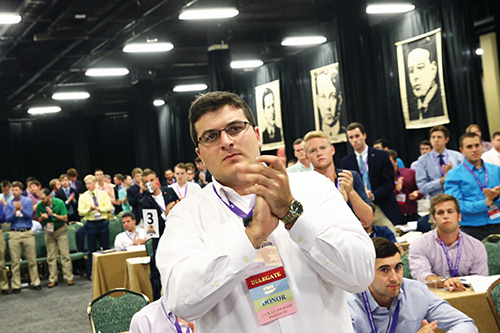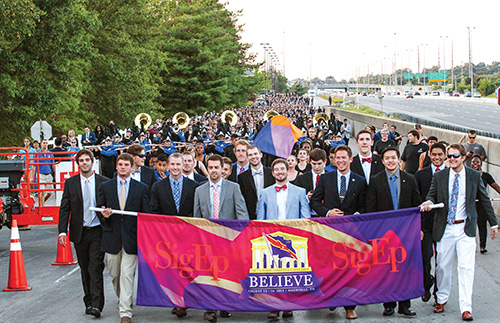
The atmosphere on the legislative floor was electric after an undergraduate-sponsored resolution to replace pledging at all chapters with SigEp’s Balanced Man Program was passed. The vote occurred on the opening day of legislation at the 54th Conclave and made SigEp the first national fraternity to abolish pledging completely with an undergraduate vote. Responding to news of the legislation, CEO Brian Warren said, “SigEp has proven that undergraduates are capable of leading major, positive change for their Fraternity.”
When SigEp created the Balanced Man Program in 1991, it represented a strong contrast to other fraternities’ pledge programs as it sought to combat negative stereotypes associated with Greek life and align the Fraternity with its founding values. In the following decades, other groups attempted to replicate the program, adopting non-pledging development models at the national level. However, SigEp remains the sole fraternity to remove pledging through an undergraduate vote, rather than a top-down mandate.
The 2015 Conclave vote was the product of an undergraduate-led effort to align all chapters behind what has become a brand-defining program. By the end of the 2014-2015 school year, 215 of SigEp’s 228 chapters had selected the program as their model for member development. Over the summer, a coalition of undergraduate brothers from South Carolina, Ohio State, Georgia, South Florida, Drexel, Montana State, Oklahoma State and Nebraska met to draft a resolution that would make the Balanced Man Program SigEp’s only development model.
Members of the coalition sought out feedback and support from undergraduates, alumni and volunteers across the country. When their resolution reached the legislative floor, 140 chapters had already weighed in to voice support.
The resolution also received the backing of each of SigEp’s 26 district governors, alumni-volunteers charged with supporting chapter volunteers in their district. In a joint letter to Conclave delegates, the district governors reflected on the clear advantage experienced by chapters already running the program. “Our chapters that are successfully implementing the BMP are leaders in the classroom, on the athletic fields, and in the community,” the district governors wrote. “They can tangibly demonstrate to future SigEps and their parents that by joining SigEp they will not only enjoy a rewarding and fun undergraduate experience, but will be better prepared for life after college.”
SigEp’s Past Grand Presidents also expressed support for the resolution. In an open letter to delegates, they reflected on how the world of higher education had changed over the course of their collective terms and how the reform could bring all chapters “closer to our shared values and aspirations as fraternity men.”
Undergraduate delegates agreed with their assessment. “I voted for this legislation because I truly believe in the benefit of the Balanced Man Program,” said Chapter President Conner Jackson, Nebraska ’16, who was a member of the coalition. “It is constantly pushing individuals and chapters to innovate and strive to become better. I also believe that, from a national standpoint, Sigma Phi Epsilon will be stronger when all chapters are united under one development model.”
Recent graduate Max Fowler, South Carolina ’15, said he too believed the vote would unify the Fraternity on a national scale. In the summer 2015 Journal and on The SigEp Blog, Fowler and chapter brother Zachary Knight, ’14, shared the story of their introduction to SigEp, the hazing and disappointment they experienced as pledges, and how they eventually turned their chapter around. Their widely read story sparked a national discussion about the value of the pledging experience.
“The modern fraternity world is broken,” Fowler said. “Hazing allegations, mortalities, substance abuse and a number of other serious issues riddle fraternity chapters across the country. Society needs to see that the American college fraternity is still relevant, and we have to show them SigEp is leading the charge.”
Praise from higher education
The decision to universally adopt the Balanced Man Program occurred at a critical moment for both the American college fraternity system and higher education. In a July 2015 Fraternity report, CEO Warren addressed the seriousness of issues faced on today’s college campuses. “In the first four months of 2015, almost 8,000 articles were published about alcohol and sexual assault on college campuses,” Warren said. “Meanwhile, communities in higher education were consumed by conversations about sexual assault prevention, racial and ethnic diversity on campus, and the overall value of Greek life.”
While fraternities have become targets for sensationalist headlines, Warren said that SigEp is committed to providing meaningful and lasting solutions for its campus partners. “Our recent efforts and future priorities intend to fill voids felt by students, faculty and administrators, and offer a more complete collegiate experience,” he said.
The Balanced Man Program has been at the center of SigEp’s efforts to compliment the classroom experience. The program helps students navigate the 90 percent of college spent outside of a formal classroom setting and provides structure, support and guidance required to excel in school and after graduation.
SigEp Faculty Fellow Debra Mullen sees programs like the BMP as the future of Greek life. “The mug and paddle days have passed,” said Mullen, who serves as associate dean at the University of Nebraska-Lincoln’s College of Education and Human Sciences. “If collegiate-age SigEps are growing into manhood, they will get there faster and with more dignity by challenging their need to be egocentric, hedonistic and constantly vying for dominance,” she said, referring to the all-too-common realities of contemporary pledge programs. Mullen thinks that “real men recognize real challenge,” and the BMP’s platform of continuous development is attracting and producing the kind of men that undergraduates, alumni and universities are looking for in their chapters.
Opinions similar to Mullen’s are common among university faculty and staff. The Balanced Man Program has been cited as a model in higher education since its inception and continues to make SigEp an attractive partner for schools across the country.
“When campuses and fraternities partner around a common hope to nurture the best qualities of young men, good things happen,” said Frank Shushok, Virginia Tech’s senior associate vice president for student affairs. Virginia Tech alumni are working with Shushok to return SigEp to campus this fall. The chapter was closed in 2013 after a culture of hazing developed in their pledge program. This will be the first time the Virginia Tech Chapter has operated the Balanced Man Program. “Sigma Phi Epsilon and Virginia Tech are walking in step to ensure our collective aims are achieved. We fully expect the outcome will be a chapter designed to build leaders, learners and the most decent of human beings,” said Shushok.
Similarly, Clarion University sought the return of SigEp to their campus because of the Balanced Man Program. “Sigma Phi Epsilon was specifically identified as an organization we were interested in joining the university, in large part because of the way in which the organization expresses its values through programs like the Balanced Man Program,” said Clarion President Karen Whitney.
For other campus administrators, the program is changing their opinions about the potential of Greek life. “Many presidents who come to colleges and universities assume the worst,” said Valparaiso President Mark Heckler. “[SigEp] provided a wonderful example of what a group of brothers could do if they came together and said, ‘We want to have the best house possible, the best living environment, the best academic support community, the best group of athletes.’”
Supporting the switch

SigEp’s new Grand President, Rick Bennet, Central Missouri ’74, said the Fraternity’s top priority during his term will be helping chapters implement the Balanced Man Program.
The final legislation called on all remaining pledge-model chapters to adopt the program and begin the process of implementing it before December 31, 2015. Chapters already running the Balanced Man Program were charged with ensuring their operations align fully with the program’s philosophical tenets: equal rights and responsibilities, continuous development, accountability, living the Ritual, and mentoring. The legislation further tasked the Headquarters staff with expanding services and resources to assist chapters in implementation. An online platform to help chapters better manage the program’s progressive challenges and the individual progress of members was specifically requested in the legislation.
Nebraska President Conner Jackson said he and the rest of the coalition are eager to turn their energy to helping former pledge-model chapters transition to the Balanced Man Program. Since Conclave, undergraduate leaders and volunteers from these chapters have become peer mentors for their counterparts at chapters implementing the program for the first time. Meanwhile, brothers at both transitioning and longtime Balanced Man Program chapters are seeing the legislation as an opportunity to improve operationally and strengthen their cultures around equal rights and responsibilities and development for older members.
Former Vice President of Member Development and current Chaplain Gavin Doll, Wright State ’17, said his chapter voted to adopt the Balanced Man Program before Conclave. “We were happy with our performance as a pledge-model chapter, but some of us started to see it lead us down a bad path. Over the next year, we spent countless hours researching, planning, working with our regional director and educating our chapter brothers about the BMP.”
Since making the switch, Doll said, “Everything has changed for the better.” He admits they still have work to do to improve their program, but says the focus of the chapter has seen a 180-degree turn. “The important thing is to embrace the original SigEp traditions that started in 1901,” said Doll. “Our Founding Fathers believed in equal membership. Pledging was a time to learn about the Fraternity, not to treat members differently. Hazing developed much later. It hasn’t always been a part of the fraternity experience, and it shouldn’t be anymore.”







